|
|
| View previous topic :: View next topic |
| Author |
Entry, Exit and Stop Loss guidelines - Swing pivots system |
Speculator
Expert

Joined: 15 Apr 2008
Posts: 149
|
Post: #1  Posted: Sat Jan 30, 2010 4:20 pm Post subject: Entry, Exit and Stop Loss guidelines - Swing pivots system Posted: Sat Jan 30, 2010 4:20 pm Post subject: Entry, Exit and Stop Loss guidelines - Swing pivots system |
 |
|
While it's fun hanging out in the shoutbox, it can be a source of distraction answering questions during the trading hours related to my system and sometimes answering the same questions again and again. My swing system is a dynamic system which tries to capture market action between swing reversal points. By dynamic what i mean is, instead of imposing artificial boundaries or targets for a swing, i let the market action establish the pivots and reversal points.
Detailed document on this system can be found in an another thread
http://www.icharts.in/forum/swing-trading-the-speculator-way-t2230.html
The reason i posted this system here is twofold.
1) I often see new traders asking questions like
Where do we close today ? Are we going up or down today ?
Is this a time to go long/short ?
What do you think the market will be tommorow ?
I am trapped in a position. What should i do ?
Will Nifty hit 3000 ? Will Nifty go to 8000 ?
These are all newbie questions. And they are irrelavent to trading. In trading you only need to know where to enter, your stop loss and where to exit. To enter you need to understand the concept of reversal. For a secure stop, you need to have rules and ideas as to where to put them. Exit again requires the knowledge of reversal.
2) I have learn't various techniques over the years from many good hearted traders who have generously shared their techniques. This is a unique technique that i have developed, for my trading purposes and i just think it's good "Karma" to share it with fellow traders. If the technique suits you or you find it useful, use it, or else junk it. All i can say is it works for me.
Entry, Exit and Stop rules/guidelines (For Type I reversals)
In my system swing reversal is simply defined as taking out the prior swing pivot. So where does one enter and exit ?. For upside reversal, one should enter as soon as the prior downswing pivot (shown in down arrow in the chart) is crossed and exit when the upswing pivot (shown in up arrow on the chart) is taken out. For downside reversal, enter on break below the upswing pivot and exit on crossing of downswing pivot. While this is the theory, in practice this would require very wide stops. So to make it practical, i have defined a few entry and exit rules. You may develop your own rules based on what suits your risk tolerance. A picture is worth thousand words. So i have attached four charts, two showing upside reversal entry technique (NF1.gif and NF2.gif) and two showing downside reversal entry technique (NF3.gif and NF4.gif).
Entry and Stop loss
Technique #1: (Recommended technique)
(i) For upside reversal wait for a green candle which closes above the prior downswing pivot and the candle should also close above the prior candle high. Candle close above the prior candle high ensures that the momentum is in your favor. Stop loss should be below the reversal candle. If the candle is too big and requires a very big stop loss which does not suit your risk tolerance, don't take the trade. It's not the end of the world. In such cases, wait for a pullback to 34 ema and rejection to enter.
In NF1.gif, there's a candle in the red circle which takes out the downswing pivot, but fails to close in a green candle above the prior candle high. The price action after that is one of a pullback rather than acceleration. So that's not a good entry point. That highlights the necessity of a candle closing above prior candle high, which ensure price acceleration, since the momentum will be in your favor.
(ii) For downside reversal the rules are same. We need a red candle which closes below the prior upswing pivot and close below the prior candle low. Stop loss rules are different here. One should place the stop loss above the immediate swing high on the charts. The reason being, tops have different characteristics than bottoms. Bottoms tend to be "V" affairs. Tops are "M" affairs. Tops gets tested many times before we go down in earnest. So putting a stop above the red reversal candle will almost always result in a stop-out.
Technique #2:
One can start a daytrade from lower levels and convert it into a swing trade, if the swing pivot is taken out. If we fail to take out the swing pivot, close it out as a daytrade. This is assumes that one has good daytrading techniques to enter from lower levels. Although i use this approach often, it's not a recommended technique.
Exit rules
Technique #1: One can exit the entire position at the swing reversal. Although this is the right technique in strongly trending markets, it may wipe out all the profits in range bound markets upon reversal.
Technique #2: This is the technique i use. I exit about 30% of my positions on a 1:2 risk/reward. So if my stop size (risk) is 50 points, i close 30% of my positions on a reward of 2*50 = 100 points. The rest, i close on swing reversal.
Enjoy and good luck with your trading !
Naveen Swamy
- a.k.a Speculator[url][/url]
| Description: |
|
| Filesize: |
22.39 KB |
| Viewed: |
2610 Time(s) |
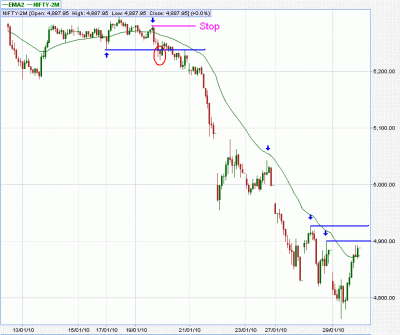
|
| Description: |
|
| Filesize: |
23.58 KB |
| Viewed: |
1764 Time(s) |
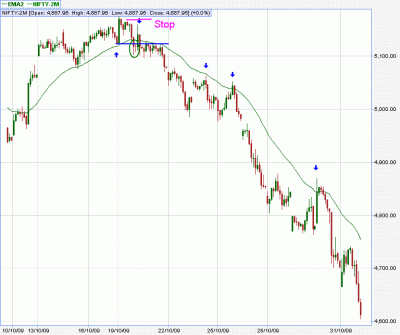
|
| Description: |
|
| Filesize: |
27.1 KB |
| Viewed: |
1830 Time(s) |
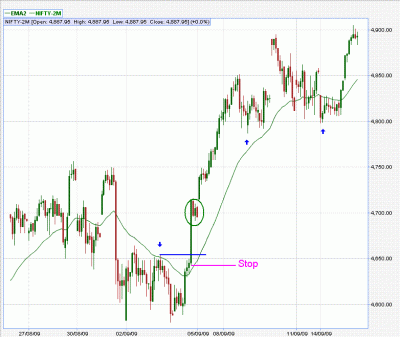
|
| Description: |
|
| Filesize: |
27.9 KB |
| Viewed: |
2082 Time(s) |
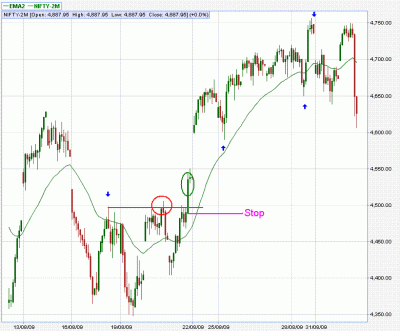
|
|
|
| Back to top |
|
 |
|
|  |
drsureshbs
White Belt

Joined: 22 Oct 2008
Posts: 58
|
Post: #2  Posted: Mon Feb 01, 2010 12:29 am Post subject: Posted: Mon Feb 01, 2010 12:29 am Post subject: |
 |
|
THanq speculator for starting this thread .Can u pl eloborate a little bit about prices trading in arange rsi interpretation
thanking u n regards
dr suresh shetty
|
|
| Back to top |
|
 |
sunrays
White Belt

Joined: 19 Dec 2009
Posts: 71
|
Post: #3  Posted: Sun Feb 07, 2010 3:06 am Post subject: outstanding Posted: Sun Feb 07, 2010 3:06 am Post subject: outstanding |
 |
|
xcellent work speck....
i should say excellent service to traders
|
|
| Back to top |
|
 |
amitkbaid1008
Yellow Belt

Joined: 04 Mar 2009
Posts: 540
|
Post: #4  Posted: Sat Jan 22, 2011 5:05 pm Post subject: Re: Entry, Exit and Stop Loss guidelines - Swing pivots syst Posted: Sat Jan 22, 2011 5:05 pm Post subject: Re: Entry, Exit and Stop Loss guidelines - Swing pivots syst |
 |
|
| Speculator wrote: | While it's fun hanging out in the shoutbox, it can be a source of distraction answering questions during the trading hours related to my system and sometimes answering the same questions again and again. My swing system is a dynamic system which tries to capture market action between swing reversal points. By dynamic what i mean is, instead of imposing artificial boundaries or targets for a swing, i let the market action establish the pivots and reversal points.
Detailed document on this system can be found in an another thread
http://www.icharts.in/forum/swing-trading-the-speculator-way-t2230.html
The reason i posted this system here is twofold.
1) I often see new traders asking questions like
Where do we close today ? Are we going up or down today ?
Is this a time to go long/short ?
What do you think the market will be tommorow ?
I am trapped in a position. What should i do ?
Will Nifty hit 3000 ? Will Nifty go to 8000 ?
These are all newbie questions. And they are irrelavent to trading. In trading you only need to know where to enter, your stop loss and where to exit. To enter you need to understand the concept of reversal. For a secure stop, you need to have rules and ideas as to where to put them. Exit again requires the knowledge of reversal.
2) I have learn't various techniques over the years from many good hearted traders who have generously shared their techniques. This is a unique technique that i have developed, for my trading purposes and i just think it's good "Karma" to share it with fellow traders. If the technique suits you or you find it useful, use it, or else junk it. All i can say is it works for me.
Entry, Exit and Stop rules/guidelines (For Type I reversals)
In my system swing reversal is simply defined as taking out the prior swing pivot. So where does one enter and exit ?. For upside reversal, one should enter as soon as the prior downswing pivot (shown in down arrow in the chart) is crossed and exit when the upswing pivot (shown in up arrow on the chart) is taken out. For downside reversal, enter on break below the upswing pivot and exit on crossing of downswing pivot. While this is the theory, in practice this would require very wide stops. So to make it practical, i have defined a few entry and exit rules. You may develop your own rules based on what suits your risk tolerance. A picture is worth thousand words. So i have attached four charts, two showing upside reversal entry technique (NF1.gif and NF2.gif) and two showing downside reversal entry technique (NF3.gif and NF4.gif).
Entry and Stop loss
Technique #1: (Recommended technique)
(i) For upside reversal wait for a green candle which closes above the prior downswing pivot and the candle should also close above the prior candle high. Candle close above the prior candle high ensures that the momentum is in your favor. Stop loss should be below the reversal candle. If the candle is too big and requires a very big stop loss which does not suit your risk tolerance, don't take the trade. It's not the end of the world. In such cases, wait for a pullback to 34 ema and rejection to enter.
In NF1.gif, there's a candle in the red circle which takes out the downswing pivot, but fails to close in a green candle above the prior candle high. The price action after that is one of a pullback rather than acceleration. So that's not a good entry point. That highlights the necessity of a candle closing above prior candle high, which ensure price acceleration, since the momentum will be in your favor.
(ii) For downside reversal the rules are same. We need a red candle which closes below the prior upswing pivot and close below the prior candle low. Stop loss rules are different here. One should place the stop loss above the immediate swing high on the charts. The reason being, tops have different characteristics than bottoms. Bottoms tend to be "V" affairs. Tops are "M" affairs. Tops gets tested many times before we go down in earnest. So putting a stop above the red reversal candle will almost always result in a stop-out.
Technique #2:
One can start a daytrade from lower levels and convert it into a swing trade, if the swing pivot is taken out. If we fail to take out the swing pivot, close it out as a daytrade. This is assumes that one has good daytrading techniques to enter from lower levels. Although i use this approach often, it's not a recommended technique.
Exit rules
Technique #1: One can exit the entire position at the swing reversal. Although this is the right technique in strongly trending markets, it may wipe out all the profits in range bound markets upon reversal.
Technique #2: This is the technique i use. I exit about 30% of my positions on a 1:2 risk/reward. So if my stop size (risk) is 50 points, i close 30% of my positions on a reward of 2*50 = 100 points. The rest, i close on swing reversal.
Enjoy and good luck with your trading !
Naveen Swamy
- a.k.a Speculator[url][/url] |
Spec better if you had added this to your original document file so that it can easily be downloaded
Thanx
|
|
| Back to top |
|
 |
mbn
White Belt

Joined: 29 Nov 2007
Posts: 27
|
Post: #5  Posted: Sun Jan 23, 2011 10:43 am Post subject: Posted: Sun Jan 23, 2011 10:43 am Post subject: |
 |
|
Naveen Swamy,
Thanks for sharing.
keep posting!
Regards,
mbn
|
|
| Back to top |
|
 |
Thaavo
White Belt

Joined: 23 Apr 2011
Posts: 18
|
Post: #6  Posted: Wed May 18, 2011 3:31 pm Post subject: Posted: Wed May 18, 2011 3:31 pm Post subject: |
 |
|
| mbn wrote: | Naveen Swamy,
Thanks for sharing.
keep posting!
Regards,
mbn |
its remarkable ............... thanks a lot speculator sir.........
|
|
| Back to top |
|
 |
Thaavo
White Belt

Joined: 23 Apr 2011
Posts: 18
|
Post: #7  Posted: Wed May 18, 2011 3:31 pm Post subject: Posted: Wed May 18, 2011 3:31 pm Post subject: |
 |
|
| mbn wrote: | Naveen Swamy,
Thanks for sharing.
keep posting!
Regards,
mbn |
its remarkable ............... thanks a lot speculator sir.........
|
|
| Back to top |
|
 |
chetan83
Brown Belt

Joined: 19 Feb 2010
Posts: 2037
|
Post: #8  Posted: Sat Jun 23, 2012 1:05 am Post subject: Posted: Sat Jun 23, 2012 1:05 am Post subject: |
 |
|
Dear Seniors,
Pls guide me here, How to take the long trade in YESBANK 5 mins....as even in rejection the SL was HIT....on 19/06/12.
Chetan.
| Description: |
|
| Filesize: |
297.97 KB |
| Viewed: |
910 Time(s) |
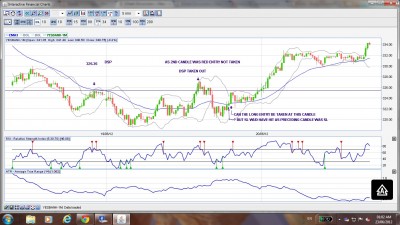
|
|
|
| Back to top |
|
 |
sonila
Brown Belt

Joined: 04 Jun 2009
Posts: 1786
|
Post: #9  Posted: Sat Jun 23, 2012 1:07 pm Post subject: Posted: Sat Jun 23, 2012 1:07 pm Post subject: |
 |
|
| chetan83 wrote: | Dear Seniors,
Pls guide me here, How to take the long trade in YESBANK 5 mins....as even in rejection the SL was HIT....on 19/06/12.
Chetan. |
chetan,
u have mentioned, the low(322.5) of the candle closed at 2.20pm on 19th jun as sl for yes bank-1m 5-tf.
but, i think, the low(321.6) of prv candle which closed at 2.15pm,should be the sl.
i may be wrong.
thnx
|
|
| Back to top |
|
 |
chetan83
Brown Belt

Joined: 19 Feb 2010
Posts: 2037
|
Post: #10  Posted: Sat Jun 23, 2012 4:37 pm Post subject: Posted: Sat Jun 23, 2012 4:37 pm Post subject: |
 |
|
| sonila wrote: | | chetan83 wrote: | Dear Seniors,
Pls guide me here, How to take the long trade in YESBANK 5 mins....as even in rejection the SL was HIT....on 19/06/12.
Chetan. |
chetan,
u have mentioned, the low(322.5) of the candle closed at 2.20pm on 19th jun as sl for yes bank-1m 5-tf.
but, i think, the low(321.6) of prv candle which closed at 2.15pm,should be the sl.
i may be wrong.
thnx |
Dear Sonila,
As per the bullish rejection trade rule, the SL shud be the preceding candle from which trade was taken......so that SL candle was of 2:20pm......let see anyone can come up and make us understand better.
Chetan.
|
|
| Back to top |
|
 |
|
|
You cannot post new topics in this forum
You cannot reply to topics in this forum
You cannot edit your posts in this forum
You cannot delete your posts in this forum
You cannot vote in polls in this forum
You can attach files in this forum
You can download files in this forum
|
Powered by phpBB © 2001, 2005 phpBB Group
|
|
|

